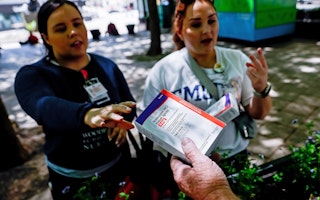Jail Is the Worst Substitute for Drug Treatment
By Brent
In 2012, Canada introduced its first-ever mandatory-minimum prison sentences for drug offenses. Subsequently, Pivot Legal Society interviewed 19 people who use drugs to ask them about their experiences with the criminal justice system. Brent (his last name is kept private) first began getting in trouble with the law when he was 18. Now 28, he spent almost half of the past decade inside. The following is from his interview.
It was overcrowded, they were triple bunking. It was my first time in jail and it was horrifying.
I know for a fact that when people know you are new to jail they’ll gang up on you and just give you a beat down just ’cause they can. Or if they check you into [protective custody], it’s like a sport: “Watch this, I’m going to check this guy in.”
There was no needles in jail whatsoever. We were using these needles that were like 10 years old. They were disgusting.
But at the time when I first went in I was coming off of heroin. … My buddy had some heroin so it doesn’t matter what the needle looked like, I just wanted to get unsick. So I used this needle that had dried blood on it.
And it was like trying to put a dull knife in my arm. The lack of clean supplies in jail is detrimental to people’s health. I’m sure that’s just a breeding ground for infectious diseases. A person in the grip of addiction will do anything to get their next fix.
I’m a little surprised that the whole system—didn’t they recognize addiction for what it is? They know the people, they see their faces come in and out of jail all the time. Why is there never any intervention? Are they just happy giving them jail sentences and when the time is up, they release them back to themselves?
It had a profound negative psychological impact on me. There is no question in my mind. … Again, they didn’t have any programs. No emphasis on rehabilitation. And every subsequent time, I never received any treatment, on the inside or on the outside either.
[When I’d get out] they give me a ticket to get downtown, and I usually have a welfare check in my hand. I have nowhere to go and no supports in place. There was no work. There is no mechanism in place to have people, you know, set up when they leave in terms of housing or support or anything of that nature that’s going to help someone when they get out of jail.
I think that’s the predominant reason why in the past 10 years I’ve been in and out of jail. It is the reason why I got stuck in that cycle, because I’ve gone from jail to the streets. And right back to my addiction, and with a few more tools because I’ve learned a few more tricks of the trade in the criminal world to better keep myself in drugs.
Jail—I am trying to word this correctly—jail, it aggravates the situation and it somehow reinforces itself. The addict starts believing they deserve it. After a while they believe they deserve to be jailed and there is no hope, and it just reinforces the whole lifestyle. It reinforces the addictive behavior when there is no mechanism in place to help them with their disease.
Pivot Legal Society’s report was supported by the Open Society Foundations.
To read others’ stories see the report, Throwing Away the Keys, on the Pivot Legal Society website.
Brent lives in Canada. He was interviewed for the report Throwing Away the Keys: The Human and Social Cost of Mandatory Minimums.


